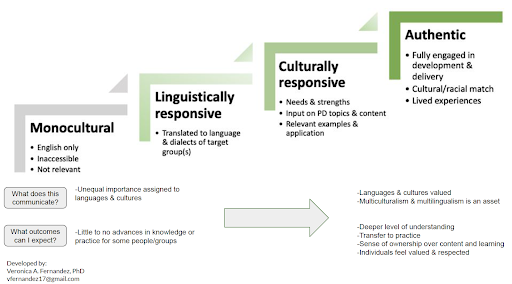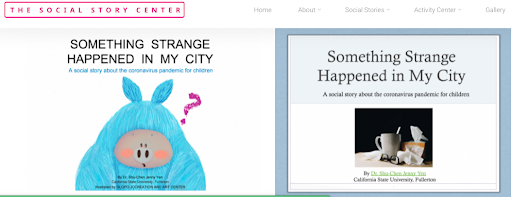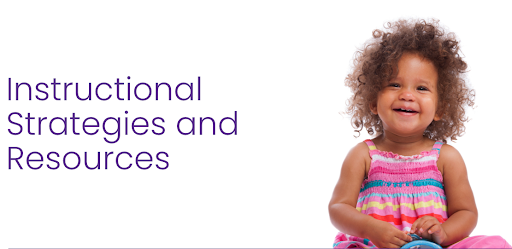First 5 California DLL Pilot Community of Practice: September 2021 Meeting Summary
By: Early Edge California, Advancement Project California, and Glen Price Group (GPG), in partnership with First 5 California and the California Department of Education
This blog is the sixth post in a series of blog posts about the DLL Pilot CoP. Click here for additional blog posts.
Resources for Educators and the Field
Tools
- Multilingual Learning Toolkit
- Personalized Oral Language Learning (pollstrategies.org)
- Dual Language Learner Supports (dllsupports.org)
- Social Story Center
Videos
- Jornada Pedagógica Internacional para la Educación Multilingüe
- Aprendizaje a distancia: cómo apoyar el aprendizaje de dos idiomas
- Aprendizaje a distancia: cómo leer cuentos con bebés y niños pequeños
Articles
- Article: “Does digital reading help improve comprehension?”
- Article: “E-Books vs. Print: What parents need to know”
- Article: “COVID-19 and Its Impact on Children’s Reading (COVID Slump)”
- Article: ”Project-Based Learning at Home”
- Article: “The Impact of Adverse Childhood Experiences on Child Development”
Policy Implications
- Ensure that local implementers of professional development have the resources and flexibility they need to authentically engage educators in the design of professional development and/or deliver professional development in the home language of educators.
- Develop funding opportunities with supports for Dual Language Learners (DLLs) and their families in mind. This should include allowable costs such as translation services and work aimed at improving professional development opportunities to make them more culturally authentic.
- Consider investing in state-wide translation services so that programs can translate materials and content in a consistent, centralized, affordable way.
The F5CA DLL Pilot Community of Practice (CoP) indicated significant interest in learning more about the topic of offering DLL professional development opportunities in the home languages of educators.
To learn more about this topic, DLL Pilot CoP members heard from a panel of state and national experts. The panel included:
- Anna Arambula-Gonzalez, Fresno Language Learning Project Coach, Fresno Unified School District
- Veronica Fernandez, Ph.D. University of Miami
- Shu-Chen Yen, Ph.D. CSU Fullerton
Veronica Fernandez presented key steps to designing culturally and linguistically authentic professional development opportunities. The ultimate goal of designing culturally and linguistically authentic professional development is so that educators have the knowledge, skills, and expertise to ensure that multilingual children have full access, effectively participate, and benefit from interactions and experiences. To create professional development opportunities that support an educator’s ability to support multilingual children in reaching this goal, Veronica Fernandez laid out a series of steps along a path to achieving fully culturally and linguistically authentic professional development:
- 1) Professional development that is monocultural.
- Professional development is offered in English only and no work has been done to present the information in a culturally relevant manner.
- 2) Professional development that is linguistically responsive.
- Professional development is translated to a language / dialect understood by the target group. Often, this professional development was originally developed in English and has been translated to a different language.
- 3) Professional development that is culturally responsive.
- Some work has been done to engage the target group in the design of the professional development that accounts for their needs and strengths and includes culturally relevant examples.
- 4) Professional development that is authentic.
- The target group was fully engaged in the design and the delivery of the professional development. There is a cultural and racial match between the target group and the professional development provider that reflects their lived experiences.
Veronica Fernandez asked DLL Pilot CoP members to reflect on where they are on this continuum today and to reflect on where they would like to be. Veronica Fernandez noted that this work is frequently carried out in incremental steps given the significant amount of time and resources needed to design professional development that is fully authentic and culturally responsive. It is important to keep the long term goal of fully authentic and culturally responsive professional development in mind when engaging with this work so as not to get discouraged if progress feels slow.
“(This process) takes time. Baby steps are fine. As long as you are intentional, you’ll get there one day.”
—CoP Member
The second panelist, Shu-Chen Yen, presented on how cultural differences share the professional development experiences and participation of different groups. She also narrowed in on delivering professional development opportunities for ECE educators speaking Mandarin. Shu Chen Yen shared several key reasons why providing professional development opportunities in the home languages of educators is important including because it:
- Helps to ensure true comprehension since direct translation of terms is not always a perfect match;
- Provides a comfort zone for participants;
- Gives participants a chance to “relax the brain;”
- Provides a safe space for learning; and it
- Allows participants to make better connections with each other and with the content.
To ensure professional development opportunities are culturally relevant for Mandarin-speaking ECE educators, Shu-Chen Yen noted that it can be helpful to limit questions and discussions to account for different learning styles and preferences. Finally, Shu-Chen Yen shared resources with the DLL Pilot CoP members including the Social Story Center which includes stories to help children process difficult experiences such as the Covid-19 pandemic or racism. These stories are available in multiple languages and include lesson plans for parents and educators.
The final panelist, Anna Arambula-Gonzalez, shared her experience working in Fresno County as a multilingual coach who is able to support ECE educators in both English and Spanish to implement the lessons learned from professional development opportunities. Anna urged DLL Pilot CoP members to follow up individually with educators in their home language especially if some or all of the training was provided in English. Given the challenges facing counties in offering professional development opportunities in the home languages of educators, Anna highlighted how the strategy of following up English-only opportunities with linguistically appropriate coaching can be a way to support educators’ abilities to access and implement key lessons from trainings.
After the panel presentation, counties shared several lessons learned regarding offering DLL professional development opportunities in the home languages of educators.
Successes and bright spots in local counties include:
- Calaveras’ work to engage families in helping to review children’s books for accuracy of cultural depictions. This effort also communicates to families that the county strongly values their voices and input.
- Los Angeles’ work engaging ECE educators to co-facilitate trainings alongside a professional development trainer which ensures that the training is translated, incorporates real life experiences, and promotes the importance of educator expertise.
- Yolo’s work to provide culturally appropriate training. For example, when a male Farsi-speaking trainer is scheduled to provide professional development to all female educators, the county pairs him with a female presenter partner to be more culturally appropriate.
Among the challenges noted was the difficulty in locating professionals who speak different languages. Oftentimes, the workload falls on staff members who can speak another language, leading to an unequal distribution of work. Suggestions were made to use contractors for translation services, to create a common list of terms, and to use google translate as a starting point for staff proficient in that language to review and correct. The financial burden of translating materials was also highlighted by counties. A request was made as part of an advocacy letter from DLL pilot counties to the State, to include translation services as an allowable cost for new grant opportunities.
Each month, a select resource is highlighted at the start of the meeting during the “Resource Corner” session. This month’s highlighted resource was Early Edge California’s newly released Multilingual Learning Toolkit. Carolyne Crolotte, Director of DLL Programs for Early Edge, provided a brief overview of this critical resource for educators who teach PreK-3rd Multilingual Learners.
This web-based toolkit includes strategies and resources related to: Family Engagement; Social-emotional Health and Development; Classroom Environments; Oral Language Development; Literacy Development; Bilingual Classrooms; Home Language Development; English Language Development; Content Learning; Assessments; and Building Educators’ Capacity.
This blog will be updated regularly to share the emerging lessons learned, needed resources, and policy recommendations coming from the DLL Pilot CoP meetings. Learn more about the First 5 CA DLL Pilot.



